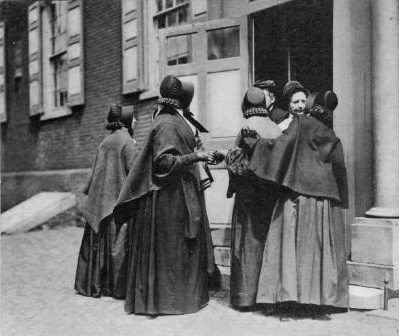The Religious Society of Friends, commonly known as Quakers, embodies a unique tapestry of Christian faith that emphasizes peace, simplicity, and communal worship. Originating in the mid-17th century in England, this spiritual movement arose amidst the tumult of the English Civil War, reflecting a profound yearning for genuine spiritual connection beyond the established church hierarchy. While superficially their beliefs may appear simple, a deeper exploration reveals a complex and rich theological framework underlying their practices.
At the heart of Quaker faith lies the belief in the “Inner Light,” or the Light of Christ within every individual. This notion posits that each person carries a divine spark, inherently connected to God. As articulated in the writings of early Quaker leaders like George Fox, this principle underscores Quakers’ commitment to the idea that revelation is not confined to scripture but is accessible to all who seek it through introspective contemplation. This spiritual egalitarianism not only fosters a vibrant personal faith but also encourages a profound sense of community, where each individual’s voice is valued within collective worship.
The Quaker practice of meeting for worship is reflective of this belief in the Inner Light. Typically held in silence, these gatherings can be profound experiences of communal spirituality. Attendees sit in expectant silence, waiting for the Holy Spirit to move among them. When inspired, individuals may rise to share messages, which are often reflections of their inner experiences or revelations. This communal silence fosters an atmosphere of openness and receptivity, allowing for a shared journey in faith that is both personal and collective. In a world often characterized by distraction and noise, this intentional commitment to silence can be particularly compelling.
Moreover, the Quaker emphasis on peace and nonviolence aligns deeply with their Christian roots. They are firmly anchored in the teachings of Jesus, particularly his admonition to love one’s neighbor and enemies alike. Historically, Quakers have been at the forefront of pacifism, advocating for social justice and opposing war. Their unwavering stance against violence is not merely a political position but a fundamental expression of their faith in action. This commitment to peace is illustrated by their active involvement in various movements, including abolitionism, civil rights, and contemporary humanitarian efforts aimed at alleviating suffering and fostering understanding among diverse communities.
What is particularly fascinating about Quakerism is its ethos of simplicity. This approach is not merely about living frugally; rather, it encapsulates a profound theological stance that prioritizes spiritual over material concerns. Early Quakers rejected ostentation, appreciating that simplicity in lifestyle allows individuals to focus on what truly matters—living a life reflective of their faith and dedicated to service. This ethos permeates their worship and community practices, where focus remains on fostering relationships and nurturing one’s spiritual life rather than accumulating wealth or status.
In a modern context, the appeal of Quakerism becomes increasingly poignant. Many individuals today are disenchanted with organized religion, often perceiving it as disconnected from the complexities of contemporary life. The Quaker principle of “testimonies”—which include simplicity, peace, integrity, community, and equality—resonates with those who seek a faith experience grounded in authenticity and social relevance. This discontent with traditional narratives often leads seekers to the Quaker way, drawn by its commitment to spiritual exploration and conscientious living.
Furthermore, the Quaker view on equality encompasses both gender and racial equality, historically positioning them as a trailblazing force in advocating for marginalized communities. The belief that all individuals carry the Inner Light has profound implications for social justice, placing Quakers at the forefront of movements for civil rights and gender equity. Their historical contribution to the abolition of slavery exemplifies how Quaker convictions transcend mere personal belief; they become a catalyst for profound societal change.
Despite their historical and religious uniqueness, Quakers have sometimes struggled with misconceptions. Some may pigeonhole them as a monolithic group devoid of theological sophistication. However, variations within Quakerism exist, with different branches such as the Conservative, Evangelical, and Liberal Quakers interpreting the Inner Light and scriptural tenets in diverse ways. These distinctions foster rich conversations within the tradition, with each branch contributing unique perspectives to the larger tapestry of Quaker beliefs.
Finally, the Quaker commitment to active inquiry reflects a broader Christian paradigm focused on understanding and interpreting faith dynamically. This includes a willingness to engage with contemporary moral dilemmas and societal issues through a lens of faith—whether it be environmental stewardship, economic justice, or mental health advocacy. Quakers exemplify the potential for a faith-based community to not only navigate change but also to actively advocate for a world that embodies their values of peace, justice, and humility.
In conclusion, the Religious Society of Friends captures a deeply compelling vision of Christianity that fuses faith with action, simplicity with complexity, and silence with profound communal connection. Quakers invite individuals to ponder not only their own spiritual journeys but also the communal implications of collective faith. Their enduring legacy, rooted in peace and an unwavering commitment to their principles, continues to offer a robust framework for understanding faith in an ever-evolving world. As seekers navigate the often overwhelming landscape of contemporary spirituality, the Quaker values of simplicity, peace, and community resonate as both timeless and profoundly relevant.



